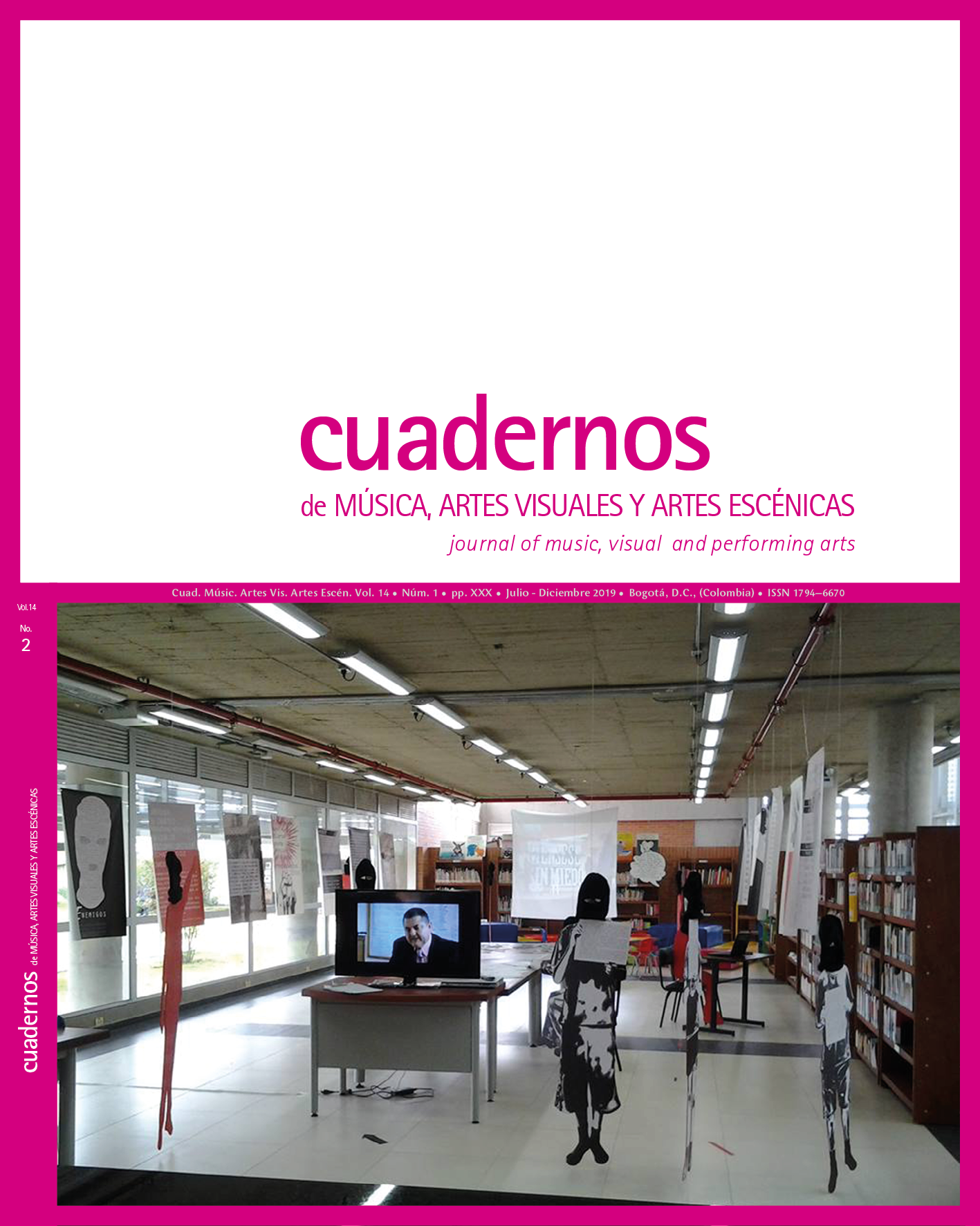Abstract
The purpose of this article is to present the results of a re- search that sought to identify some characteristics of the po- litical culture in Colombia considering the post-conflict context based on the analysis of political subjectivation processes and the visual regimes found in the documentaries Pecados de mi padre (2009), La historia que no contaron (2009), and Pizarro (2016). To that end, the hegemony category is used as a key concept to understand politics as the exercise and battle for power, which occurs on a daily basis, and which materializes in cultural productions and in the subjectivation processes. Methodologically, five main lines of analysis were considered: the revolutionary struggle, paramilitarism, drug trafficking, peace processes, and political participation. The shaping of an introspective view with regard to the individual’s privacy was identified, which manages to politicize the priva- ce and radical experience of the subject. However, the social aspect is pushed to the background, which accounts for the existence of audiovisual regimes that split the ways in which the armed conflict is seen. Thus, in the cultural field, tradi- tional political elites achieved leadership, insofar as they managed to position audiovisuals, which are part of a common sense that blurs the structural conditions that hinder the creation of an equitable country and that naturalize this situa- tion. However, the subjective search may be a condition for the articulation of alternate views of the world that enable new political subjectivation processes.
Arendt, Hannah. 2013. Sobre la revolución. Madrid: Alianza.
Atehortúa Cruz, Adolfo León y Diana Marcela Rojas Rivera. 2014. “El narcotráfico en Colombia: pioneros
y capos”. Historia y Espacio 4 (31):169-207.
Aumont, Jacques y Marie Michel. 2006. Diccionario teórico y crítico del cine. Buenos Aires: La Marca.
Benjamin, Walter. 1989. Discursos interrumpidos I. Buenos Aires: Taurus.
Bonilla, Jorge y Omar Rincón. 1998. Violencia en pantalla: televisión, jóvenes y violencia en Colombia. Diálogos de la Comunicación 53:37-50.
CNMH (Centro Nacional de Memoria Histórica). 2013. ¡Basta ya! Colombia: memorias de guerra y dignidad. Bogotá: CNMH.
Comisión de Estudios sobre la Violencia. 1995. Colombia: violencia y democracia. Bogotá: Universidad Nacional de Colombia.
Crary, Jonathan. 2008. Las técnicas del observador: visión y modernidad en el siglo XIX. Murcia: Centro de Documentación y Estudios Avanzados de Arte Contemporáneo.
Cristancho Altuzarra, José Gabriel. 2012a. “Memorias de la justicia transicional y subjetividad política en el cine colombiano de la última década”. Ponencia presentada en el Congreso Internacional Hispanic Cinemas en Transición: Cambios históricos, políticos y culturales en el cine y la televisión, Madrid, 7-9 de noviembre.
Cristancho Altuzarra, José Gabriel. 2012b. “La memoria de la violencia política en Colombia: aportes del IEPRI para su contextualización histórica y teórica”. En Las víctimas: entre la memoria y el olvido, editado
Ricardo García Duarte, Absalón Jiménez Becerra y Jaime Wilches Tinjacá, 185-195. Bogotá: Universidad Distrital Francisco José de Caldas.
Cristancho Altuzarra, José Gabriel. 2014. “La oposición política en el cine colombiano del siglo XX: memorias, regímenes audiovisuales y subjetivación política”. Cuadernos de Música, Artes Visuales y Artes Escénicas 9 (2):45-66. doi:10.11144/Javeriana.mavae9-2.opcc
Cristancho Altuzarra, José Gabriel. 2015. Memoria, oposición y subjetividad política en el cine argentino. Imagofagia 10.
Cristancho Altuzarra, José Gabriel. 2018. Tigres de papel, recuerdos de película: memoria, oposición y subjetivación política en el cine argentino y colombiano. Bogotá: Universidad Pedagógica Nacional.
Cristancho Altuzarra, José Gabriel y Herrera, Martha Cecilia. 2014. “Cultura política y constitución de subjetividades en contextos conflictivos: un análisis de la producción del Grupo de Memoria Histórica”. En La cultura al poder: Brasil, México, Colombia, Argentina, coordinado por María Alejandra Corbalán, 115-130. Buenos Aires: Biblos.
Depetris Chauvin, Irene. 2006. “Los chicos crecen: la generación de los hijos y el cine de la posdictadura”. En Trabajos de la memoria: arte y ciudad en la posdictadura argentina, coordinado por Cecilia Macón, 99-118. Buenos Aires: Ladosur.
Fals-Borda, Orlando. 2009. Una sociología sentipensante para América Latina. Víctor Manuel Moncayo, comp. Bogotá: Siglo del Hombre.
Giraldo, Carlos Alberto, Jesús Abad y Diego Pérez. 1997. Relatos e imágenes: el desplazamiento en Colombia. Bogotá: Cinep.
Grinberg Pla, Valeria. 2009. “La memoria de los hijos de los desaparecidos en el cine argentino contemporáneo: entre la subjetividad y la búsqueda de una identidad colectiva”. En Contratiempos de la memoria en la literatura argentina, editado por Miguel Dalmaroni y Rogers Geraldine, 261-304. La Plata: Universidad Nacional de La Plata.
Grossberg, Lawrence. 2009. “El corazón de los estudios culturales: contextualidad, construccionismo y complejidad”. Tabula Rasa 10.
This journal is registered under a Creative Commons Attribution 4.0 International Public License. Thus, this work may be reproduced, distributed, and publicly shared in digital format, as long as the names of the authors and Pontificia Universidad Javeriana are acknowledged. Others are allowed to quote, adapt, transform, auto-archive, republish, and create based on this material, for any purpose, provided the authorship is duly acknowledged, a link to the original work is provided, and it is specified if changes have been made. Pontificia Universidad Javeriana does not hold the rights of published works and the authors are solely responsible for the contents of their works; they keep the moral, intellectual, privacy, and publicity rights.
Approving the intervention of the work (review, copy-editing, translation, layout) and the following outreach, are granted through an use license and not through an assignment of rights. This means the journal and Pontificia Universidad Javeriana cannot be held responsible for any ethical malpractice by the authors. As a consequence of the protection granted by the use license, the journal is able to publish retractions or to correct information already published. Publishing contents in this journal does not generate royalties for contributors.


